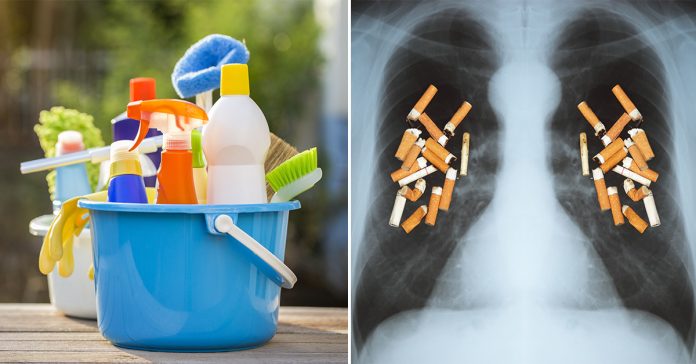You would assume that to over-sanitize and to pack your house full of store-bought cleaners would not be such a bad thing.
After all, germs and bacteria and bad for you, so it is natural that you would want to ensure that they are eradicated to the best of your abilities, right?
On top of that, as you pour some bleach down the kitchen sink and scrub it clean, you would find that there is something comforting about knowing just how clean your house is.
Unfortunately, recent studies dictate that your enthusiasm with store-bought home cleaning products may actually be unhealthy for you.
The latest example was an investigation published in the American Journal of Respiratory and Critical Care Medicine.
In it, the researchers examined home cleaning products, including sprays and other cleaners.
The results revealed that lung cancer risk in women rises in correlation to increased exposure to spray cleaners in the long term, in a manner similar to the results gathered after smoking 20 cigarettes daily.
To be clear, the goal of the investigation wasn’t to look at the impact these products had on the chances of you getting lung cancer.
Rather, in a new study on household cleaning products – the very first of this variety – the researchers were more interested in how these cleaners damage the lung and impair its function.
Over a span of twenty years, the researchers followed the health examinations of 6,000 women.
The goal was to investigate what kind of impact long-term use of cleaners had on respiratory health.
They also covered both those who cleaned domestically and those who had a profession as a cleaner.
The result – professional cleaners developed lung damage that resembled the results you would have gotten from smoking cigarettes daily for ten to twenty years.
In light of this, the Environmental Working Group’s responding science review has suggested that consumers save their money by simply purchasing less of these cleaners.
This recommendation is further enforced by the fact that manufacturers behind these store-bought cleaners aren’t obliged to reveal the full list of ingredients in their product.
There is no telling what is truly in these cleaning products, and the effect its ingredients can have on your health.

Obviously, avoiding spray cleaning products if possible is the wisest decision you can make since you can breathe in the particles.
If you really must use a spray product, however, the science review recommends spraying the solution into a cloth to reduce the number of tiny droplets you can breathe in.
In the meantime, it is best to stick to tools such as microfiber cloths and water to do your cleaning.
This study is not the only of its kind either, with many more peer-reviewed studies pointing out just how toxic these products can be.
This is all further reinforced by just how many anecdotes there are out there about how these products have created health complications or worsened pre-existing ones.
Considering most households are in no need of these industrial-strength cleaners, it is best to stick to ingredients like white vinegar, baking soda, and castile soap.
These products are perfectly safe and are usually more than enough to clean your house.
SEE ALSO:
Heart Surgeon Speaks Out About The True Cause Of Heart Disease
























